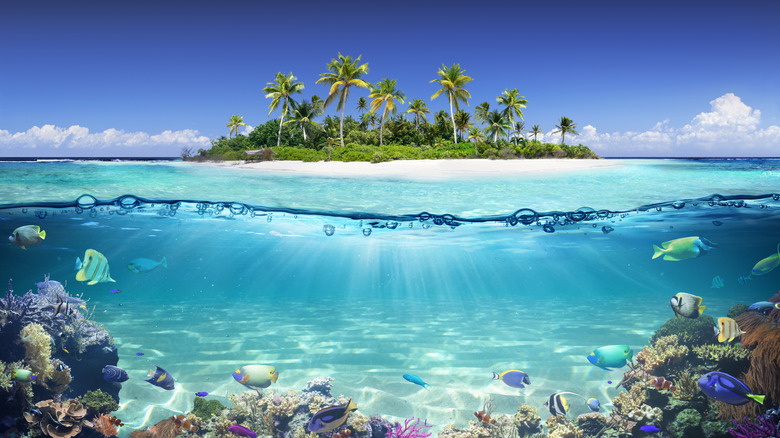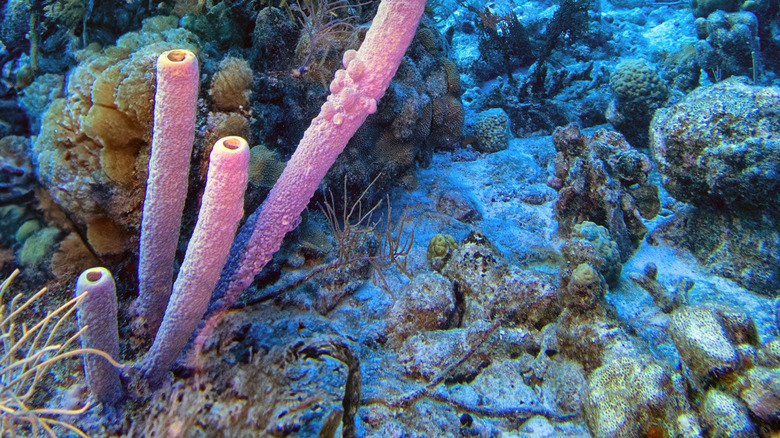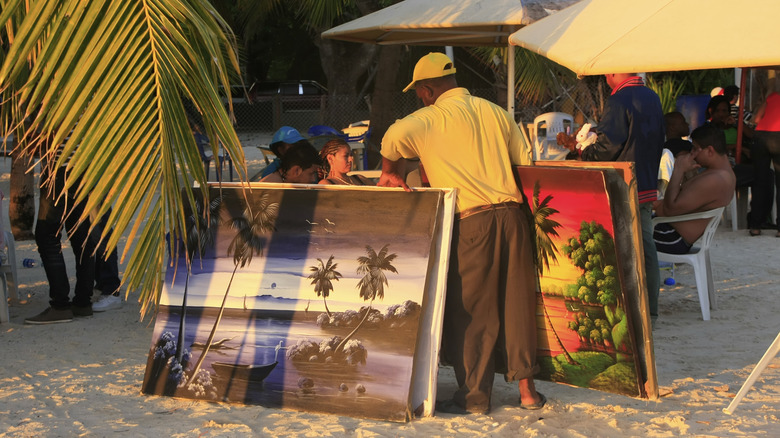Taking This Type Of Souvenir From Some Caribbean Islands Isn't Just Harmful, It's Illegal
If you love getting a keepsake from every place you visit just for the memory of it, then you may be tempted to take something like a seashell, a pinch of sand, or a trinket from your beach vacation. But you should quickly discard the thought — especially if you're thinking of pocketing a bit of coral from a Caribbean island — because you might be committing a serious crime. Taking sand, seashells, and especially coral is illegal on many Caribbean islands, including Turks and Caicos, Antigua and Barbuda, British Virgin Islands, Aruba, Saint Lucia, the Bahamas, and Saint Vincent and the Grenadines. Taking coral from these places could even result in a $50,000 fine. Even buying coral souvenirs is discouraged, and you may not even be allowed to take the pieces home.
Because of their rock-like appearance, people don't always realize that corals are living animals, and coral reefs help protect beaches, support marine life, and keep the coast safe. Tourists may take corals for their bright colors or fine shapes, unaware that it's protected. They don't know how important corals are to the health of the ocean. And while it may seem harmless to take a few shells or a bit of sand, it is not. Even dead coral plays an important role in protecting the beach and its inhabitants. It's better to take photos to keep memories of your trip than taking corals, which could damage the ecosystem and land you in trouble. There are also other unique things you can do in the Caribbean islands to preserve your travel experience.
The importance of leaving coral in its place
Corals are the foundation of the marine ecosystems known as coral reefs. Coral reefs are home to thousands of species of marine creatures, from fish and plants to invertebrates and algae. Taking corals away from these ecosystems, whether dead or alive, will only affect the general health of the reef. That's why some Caribbean islands prohibit taking any coral. It is a criminal offense that often attracts penalties, because many popular beaches and parks on Caribbean islands are considered protected areas.
Harvesting corals is harmful to reef habitats and destroys marine biodiversity. In some countries, collecting or exporting coral is considered a crime. For example in Bonaire, one of the most underrated Caribbean islands, visitors may be legally searched to ensure they do not take any coral souvenirs with them. Any coral item found will be confiscated, and the offender may be given a penalty or even arrested. Any species of coral is protected under the Convention on International Trade in Endangered Species (CITES). This measure is necessary to fight against the theory that Caribbean coral reefs could be gone in 20 years because of overfishing, pollution, and lack of protection. If you want to enjoy the sight of the much talked-about Caribbean coral reefs, these are the best Caribbean islands to visit without breaking the bank.
What you should take instead of coral souvenirs
There are many ways to take a piece of the Caribbean with you without breaking the law and getting yourself in trouble. While coral souvenirs may be appealing, there are good alternatives that do not disturb the ecosystems, and that can serve the same purpose as corals. Go for paintings, wood carvings, textiles, pottery, and other handmade crafts – made with eco-friendly and sustainable materials — that reflect the culture of the island you visit.
Additionally, there is eco-friendly jewelry and beads you can get for yourself and your loved ones. These are beads beautifully crafted from seeds and sea glass. There may be places where you can get different items inspired by coral reefs. Be sure to check the local laws in your destination before buying anything, and if you're in doubt, don't buy it.
Most importantly, no one will arrest you for taking pictures. Instead of taking that coral trinket, take a photo of it. Just as the Leave No Trace principles say, take only memories and photographs, and leave only footprints. Digitalize your experience, for what may not look harmful to you may prove much more harmful to the health of the island.


